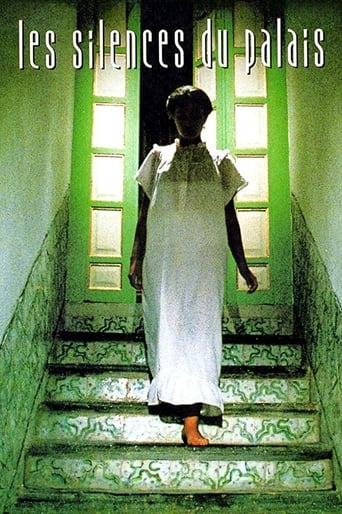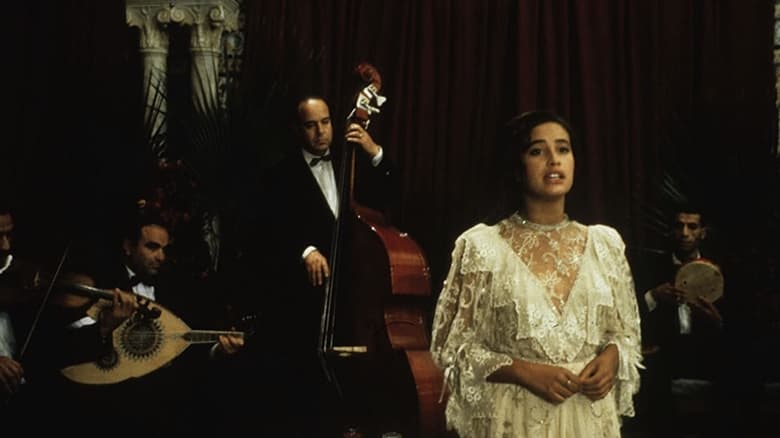

The Silences of the Palace (1994)
The death of a prince brings a young woman back to the palace where she was born into servitude. The lingering legacy is brought into light from behind frosted windows and velvet curtains.
Watch Trailer
Cast


Similar titles

Reviews
Why so much hype?
if their story seems completely bonkers, almost like a feverish work of fiction, you ain't heard nothing yet.
It’s fine. It's literally the definition of a fine movie. You’ve seen it before, you know every beat and outcome before the characters even do. Only question is how much escapism you’re looking for.
It's simply great fun, a winsome film and an occasionally over-the-top luxury fantasy that never flags.
Let us begin by discussing this film's title "The Silences of the Palace".This catchy title is an absolute misnomer as in real terms there are no silences in the palaces.Most of the palaces featured in the film are full of sounds but a feeling of silence is deliberately implied as there is no one willing to hear these sounds.Moufida Tlatli is an important name in the realm of both Arab as well as Tunisian cinema.She finished her cinema studies at famous French film institute IDHEC.Many famous Arab films bear her name as she did editing work for many prominent Arab film makers.Her debut film "The Silences of the Palace" is about the last days of Tunisian aristocracy.It was a time of confusion as Tunisian rulers were worried about their fate as the nation was looking forward to an imminent freedom.As portrayed in this film the plight of the common people including women has not changed as they are being continually forced to remain in silence.Moufida Tlatli dedicated this film to her mother who was a constant source of inspiration to her while she was drafting this film.If a list of best Arab films is drafted,this film by Moufida Tlatli will surely be there.
Assimilated into the Turkish Ottoman Empire in the 16th century, Tunisia became a French protectorate in 1881 until President Habib Bourguiba, leader of a two-year guerrilla war for independence, declared Tunisia a republic in 1957, ending the rule of the former Ottoman Beys. Winner of the Cannes Jury Prize in 1994, Tunisian director Moufid Tlatli's Silences of the Palace depicts the oppressive nature of the male-dominated palaces and the price that women servants had to pay. Required not only to cook and clean, but to serve the sexual needs of the princes, Silences shows the consequences in the lives of two strong-minded but vulnerable women: Khedija (Amel Hedhili) and her young daughter Alia (Hend Sabri).The film opens in the 1960s. Alia (Ghalia Lacroix), is now 25 and performing as a night club singer. Though she is nominally free, she is beholden to a man who refuses to marry or have children. When she learns of the death of Prince Sidi Ali (Kamel Fazaa) she returns to the palace in which she grew up to pay a condolence call to Ali's near-blind widow (Najia Ouerghi), a visit that opens the floodgates of memories. Told in flashbacks, the film shows Alia as a pre-adolescent becoming increasingly aware of her own body and sadly, of her mother's true role in the palace. Alia is a gifted singer and the musical numbers in the film are hauntingly beautiful but nothing can hide the torment the young girl faces in trying to find out who her father is and to sort out where she belongs. The performance of Ms. Sabri is wondrous as she conveys the confusion of coming of age in a non-nurturing environment while still maintaining her charm and enchanting us with her songs.Tlatli, in her first feature film, never shoots outside of the palace interior, conveying the sense of oppression and isolation though the servants listen on the radio to news about the growing struggle for independence. The women are strong and resilient, however, in spite of what they must face each day. Though Khedija tries to protect her daughter from the same fate she suffers, she knows that her power is limited. "If a man touches you, run away,'' she tells her, "Your place is with me in the kitchen." When Alia suggests that they both leave together, her mother can only respond "Where would we go? This is the only home I've ever known." While Tlatli bravely challenges the institutions that led to male dominance, there is a tone of resignation and acceptance in the silences that suggests the subservient role many women play in Moslem countries to this day. Silences of the Palace is a lovely film but one that left me with a sense of aching loss.
The best film ever made in the Arab World really isn't a superlative that would be difficult to attain, but this film is really a masterwork.Aliya a singer with an superb voice but little success is invited to the palace where she spent her childhood as the daughter of a servant. She never really got to know who her father was, that she has been invited back to the palace after the head of the household, member of the Turkish ruling family of pre-independence Tunisia has died is no accident.Back in the palace all her childhood memories come back to Alia. She remembers her mother being the concubine of the deceased. His wife was barren, and she becomes sure that she is his daughter.She also remembers how her love for music helped her to gain prestige in the palace. But the songs she sang were not just entertainment. The melodies of Umm Kulthum were broadcasted by Radio Cairo to spread the message of Arab awakening and the longing for independence. Albeit its political aspects also the ruling family, a puppet on the strings of the French, enjoys the music. But for the masses the songs also become a symbol for the longing for freedom. falls in love with one student who is an independence activist. He is hiding in the palace where his aunt is another servant. He promises her a brilliant future but already at the beginning of the film we are told that the promise was not to be kept.The film is a ingenious ridiculization of political rhetoric and seldom ever has Oriental music bee integrated in a film so brilliantly (except perhaps Ray's Jalsaghar). You will enjoy it even if Arab music doesn't mean anything to you.
This film is a gateway to Tunisian culture as it was when the country became independent. The principal character is a young girl who lives in a palace, but she is not a princess. In fact, her mother is some kind of a slave who works there without beeing paid for it and having any chance to get out of the palace. She doesn't want to tell her daughter, who her father is. Outside, the country is aiming to get loose of the French power. This is a story about strong women who live and work together and take care of each other. They are not beautiful like the American or European film stars, but still somehow sexy and very feminine. They are afraid of their sexuality, because they cannot control the desire it awakes in the powerful men around them. Their only hope to get out of the palace is marriage, but very few men see them inside the walls of the palace. One could think that the movie is very pessimistic. In the contary, the love of the women and of music create an atmosphere of hope and the new generation has a possibility to choose...







